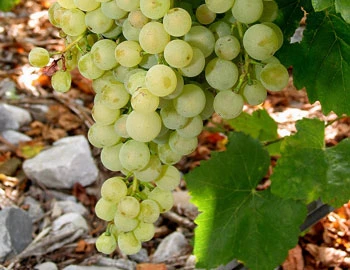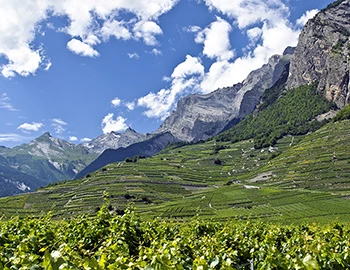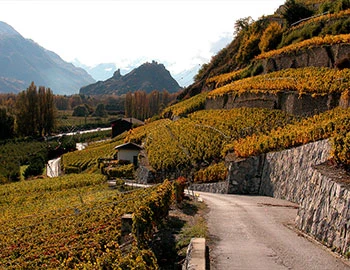Amigne de Vétroz 2022
AOC Wallis, Bonvin, 750 ml

| Grape variety: | Amigne |
| Producer: | Bonvin |
| Origin: | Switzerland / Wallis |
Description
A versatile wine for those who appreciate the sweet things. Its bouquet is reminiscent of freshly grated nutmeg, mirabelle compote, honey and saffron. But the sweetness is balanced by the juicy acidity and a spicy note. An unexpected pleasure!
Attributes
| Origin: | Switzerland / Wallis |
| Grape variety: | Amigne |
| Label: | Vegan |
| Ripening potential: | 1 to 10 years |
| Drinking temperature: | 10 to 12 °C |
| Food Pairing: | Apéro pastries, Foie gras, Spicy hard cheese, Cakes, biscuits, pastries |
| Volume: | 14.0 % |
| Note: | Contains sulphites |
Amigne
The wine with the bees
What does the Amigne have to do with bees? This white Valais specialty is the flagship of the village of Vétroz. It is distinguished by its aromas of orange and tangerine and by its lively acidity. Above all, it covers the whole spectrum of wine types, from bone dry to nobly sweet. And this is where the bees come into play. To help consumers know what type they are getting, the winemakers from Vétroz have produced a logo: one bee on the bottle signifies a dry wine, two bees mean semisweet and three bees stand for a sweet variety. Tip: try the dry or slightly sweet version with a poultry pâté. The sweet wines harmonize perfectly with fruit desserts like tarte Tatin. By the way: all of the wines from Amigne can age quite excellently.

Wallis
Valais: Alpine wines with class
More than 20 varieties of grapes can yield wines in Valais that are full of character. A large number of them grow on spectacular, steep slopes. Sealed off by mighty chains of mountains, old plantings like Petite Arvine, Amigne and Cornalin have survived in Valais, and today they are highly sought-after by wine enthusiasts. The highest vineyards in Europe are also found in Valais: the Savignin vines (known here as “Heida”), rooted in the mountain community of Visperterminen.

Switzerland
Switzerland – A small country with enormous diversity
Switzerland is famous for its banks, watches, and cheese, but not necessarily for its wine. The Swiss didn't invent wine, but they have been extremely open and curious to it. Wine culture arrived in what is now modern Switzerland via several routes: from Marseilles to Lake Geneva and the Lower Valais region; from the Aosta Valley through the Great St. Bernard Pass to the rest of Valais; from the Rhone through Burgundy, across the Jura Mountains to Lake Constance; and from Lombardy to Ticino, and then on to Grisons.



